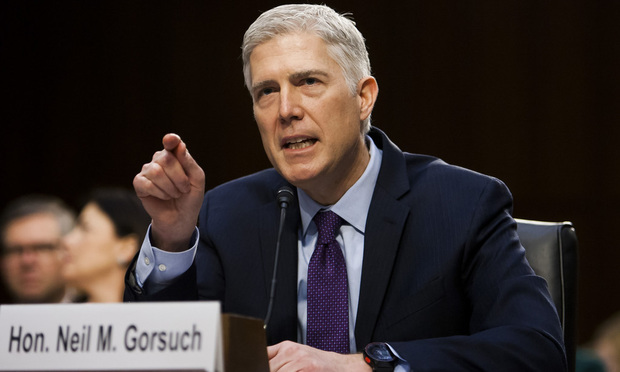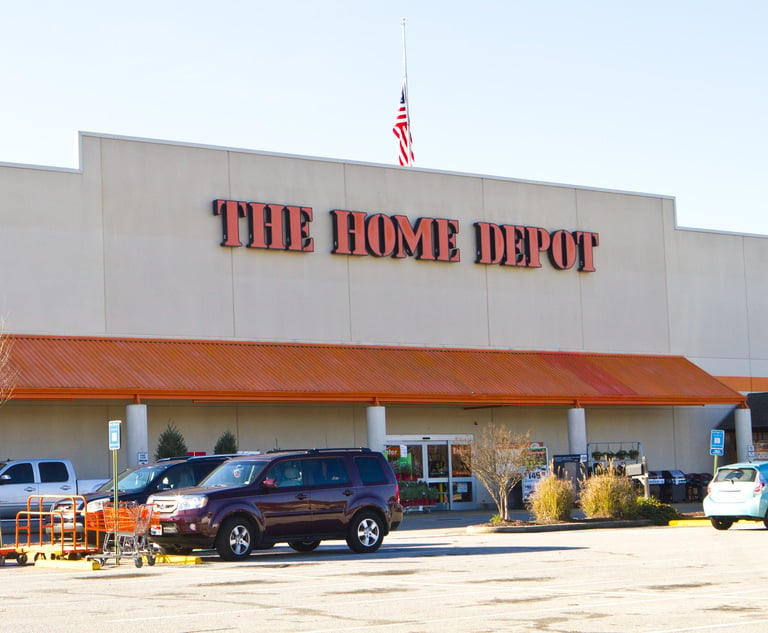Justices, Divided, Say Employment Contracts Banning Class Actions Are Lawful
"The policy may be debatable but the law is clear: Congress has instructed that arbitration agreements like those before us must be enforced as written," Justice Neil Gorsuch wrote for the majority. In dissent, Justice Ruth Bader Ginsburg called the decision "egregiously wrong."
May 21, 2018 at 10:17 AM
5 minute read
 Justice Neil Gorsuch wrote for the court in a trio of cases. (Photo: Diego M. Radzinschi / ALM)
Justice Neil Gorsuch wrote for the court in a trio of cases. (Photo: Diego M. Radzinschi / ALM)
Updated at 1 p.m. ET
Workplace employment agreements that ban class actions do not violate federal labor laws, the U.S. Supreme Court ruled on Monday.
The justices, in a 5-4 decision, sided with employers and the Trump administration's Justice Department, which last June abandoned the Obama-era support of the National Labor Relations Board's position.
The high court ruling, authored by Neil Gorsuch, came in a trio of cases: NLRB v. Murphy Oil USA (from the U.S. Court of Appeals for the Fifth Circuit); Epic Systems Corp. v. Lewis (Seventh Circuit), and Ernst & Young v. Morris (Ninth Circuit).
“The policy may be debatable but the law is clear: Congress has instructed that arbitration agreements like those before us must be enforced as written,” Gorsuch wrote. He was joined by Chief Justice John Roberts Jr. and justices Anthony Kennedy, Clarence Thomas and Samuel Alito Jr.
Gorsuch also wrote that the court had to abide by “a congressional command requiring us to enforce, not override, the terms of the arbitration agreements before us.”
In dissent, Justice Ruth Bader Ginsburg called the majority decision “egregiously wrong.” She called on Congress to counter the decision.
“Congressional correction of the court's elevation of the FAA over workers' rights to act in concert is urgently in order,” she wrote. Justices Stephen Breyer, Sonia Sotomayor and Elena Kagan joined Ginsburg's dissent, which she read in part from the bench Monday.
The federal labor board had ruled that bans of class or collective actions ran afoul of the National Labor Relations Act. But the government and employers argued that arbitration agreements containing the bans had to be enforced under the Federal Arbitration Act. The labor board's then-general counsel, Richard Griffin, represented the board's position during arguments—the first of the high court's current term.
Dozens of companies in retail, health care and technology, among other industries, were waiting for the Supreme Court's decision. Companies sued over alleged labor violations rooted in arbitration agreements include household names such as AT&T Mobility Service, Uber Technologies Inc., Kmart Corp., UnitedHealth Group Inc. and Neiman Marcus.
“This decision confirms that class action waivers in arbitration agreements are lawful,” said Lauren Novak, a partner at Schiff Hardin. “It allows the countless employers that have spent time and effort defending their employment agreements before the National Labor Relations Board and in the appellate courts to breathe a collective sigh of relief.”
Opponents of class action waivers saw meaning in the fact that Gorsuch wrote for the majority. “Make no mistake, working people in this country will be hurt by today's ruling, while the U.S. Chamber of Commerce will surely consider this an early return on their investment in President Trump's highest-profile judicial nomination, said Elizabeth Wydra, president of of the Constitutional Accountability Center.
A recent memorandum from the NLRB general counsel's office identified 152 cases awaiting the Supreme Court decision. Of those, 52 are on hold in appeals courts around the country.
The issue before the justices took on even wider public scrutiny with the dawning of the #MeToo movement in which a growing number of women spoke out—despite mandatory arbitration agreements—about workplace sexual harassment.
An estimated 25 million nonunion, private employees have arbitration agreements waiving class actions.
The issue before the justices was rooted in a 2012 board ruling that said the homebuilder D.R. Horton's class action waivers violated federal labor law. Agreements that require employees to use arbitration for all work-related disputes interfered with employees' right to engage in concerted activities under the National Labor Relations Act, the board determined. The board said that, when such an agreement violates the act, the Federal Arbitration Act does not require its enforcement.
During arguments on Oct. 2, the employers' counsel, Kirkland & Ellis partner Paul Clement, argued that Supreme Court arbitration decisions offered “a well trod path” to resolving the issue and any tie, he added, goes to the Federal Arbitration Act. He drew support in the argument from Principal Deputy Solicitor General Jeffrey Wall.
But the NLRB's Griffin countered that the board's position that class waivers violated labor laws relied on “long-standing precedent.” Workers can agree to arbitrate individually, he said, as long as there is some forum for collective actions. Griffin shared argument time with Daniel Ortiz of the University of Virginia law school, representing one of the employees in the case.
The court's ruling is posted below:
Read more:
Supreme Court's Employment Contract Case Will Have Broad Reach. Here's How We Know
Trump's DOJ Switches Sides in Key Labor Case, Now Fights Class Actions
Susan Fowler, Uber's Thorn, Shares Her Story With the Supreme Court
Dozens of Companies Await SCOTUS Ruling on Workplace Class-Action Bans
Trump Picks Morgan Lewis Partner John Ring to Fill NLRB Vacancy
This report was updated with additional comment about the ruling.
This content has been archived. It is available through our partners, LexisNexis® and Bloomberg Law.
To view this content, please continue to their sites.
Not a Lexis Subscriber?
Subscribe Now
Not a Bloomberg Law Subscriber?
Subscribe Now
NOT FOR REPRINT
© 2025 ALM Global, LLC, All Rights Reserved. Request academic re-use from www.copyright.com. All other uses, submit a request to [email protected]. For more information visit Asset & Logo Licensing.
You Might Like
View All
4th Circuit Upholds Virginia Law Restricting Online Court Records Access
3 minute read
Supreme Court Considers Reviving Lawsuit Over Fatal Traffic Stop Shooting

Is 1st Circuit the New Center for Trump Policy Challenges?

Insurance Policies Don’t Cover Home Depot's Data Breach Costs, 6th Circuit Says
Trending Stories
- 1We the People?
- 2New York-Based Skadden Team Joins White & Case Group in Mexico City for Citigroup Demerger
- 3No Two Wildfires Alike: Lawyers Take Different Legal Strategies in California
- 4Poop-Themed Dog Toy OK as Parody, but Still Tarnished Jack Daniel’s Brand, Court Says
- 5Meet the New President of NY's Association of Trial Court Jurists
Who Got The Work
J. Brugh Lower of Gibbons has entered an appearance for industrial equipment supplier Devco Corporation in a pending trademark infringement lawsuit. The suit, accusing the defendant of selling knock-off Graco products, was filed Dec. 18 in New Jersey District Court by Rivkin Radler on behalf of Graco Inc. and Graco Minnesota. The case, assigned to U.S. District Judge Zahid N. Quraishi, is 3:24-cv-11294, Graco Inc. et al v. Devco Corporation.
Who Got The Work
Rebecca Maller-Stein and Kent A. Yalowitz of Arnold & Porter Kaye Scholer have entered their appearances for Hanaco Venture Capital and its executives, Lior Prosor and David Frankel, in a pending securities lawsuit. The action, filed on Dec. 24 in New York Southern District Court by Zell, Aron & Co. on behalf of Goldeneye Advisors, accuses the defendants of negligently and fraudulently managing the plaintiff's $1 million investment. The case, assigned to U.S. District Judge Vernon S. Broderick, is 1:24-cv-09918, Goldeneye Advisors, LLC v. Hanaco Venture Capital, Ltd. et al.
Who Got The Work
Attorneys from A&O Shearman has stepped in as defense counsel for Toronto-Dominion Bank and other defendants in a pending securities class action. The suit, filed Dec. 11 in New York Southern District Court by Bleichmar Fonti & Auld, accuses the defendants of concealing the bank's 'pervasive' deficiencies in regards to its compliance with the Bank Secrecy Act and the quality of its anti-money laundering controls. The case, assigned to U.S. District Judge Arun Subramanian, is 1:24-cv-09445, Gonzalez v. The Toronto-Dominion Bank et al.
Who Got The Work
Crown Castle International, a Pennsylvania company providing shared communications infrastructure, has turned to Luke D. Wolf of Gordon Rees Scully Mansukhani to fend off a pending breach-of-contract lawsuit. The court action, filed Nov. 25 in Michigan Eastern District Court by Hooper Hathaway PC on behalf of The Town Residences LLC, accuses Crown Castle of failing to transfer approximately $30,000 in utility payments from T-Mobile in breach of a roof-top lease and assignment agreement. The case, assigned to U.S. District Judge Susan K. Declercq, is 2:24-cv-13131, The Town Residences LLC v. T-Mobile US, Inc. et al.
Who Got The Work
Wilfred P. Coronato and Daniel M. Schwartz of McCarter & English have stepped in as defense counsel to Electrolux Home Products Inc. in a pending product liability lawsuit. The court action, filed Nov. 26 in New York Eastern District Court by Poulos Lopiccolo PC and Nagel Rice LLP on behalf of David Stern, alleges that the defendant's refrigerators’ drawers and shelving repeatedly break and fall apart within months after purchase. The case, assigned to U.S. District Judge Joan M. Azrack, is 2:24-cv-08204, Stern v. Electrolux Home Products, Inc.
Featured Firms
Law Offices of Gary Martin Hays & Associates, P.C.
(470) 294-1674
Law Offices of Mark E. Salomone
(857) 444-6468
Smith & Hassler
(713) 739-1250








